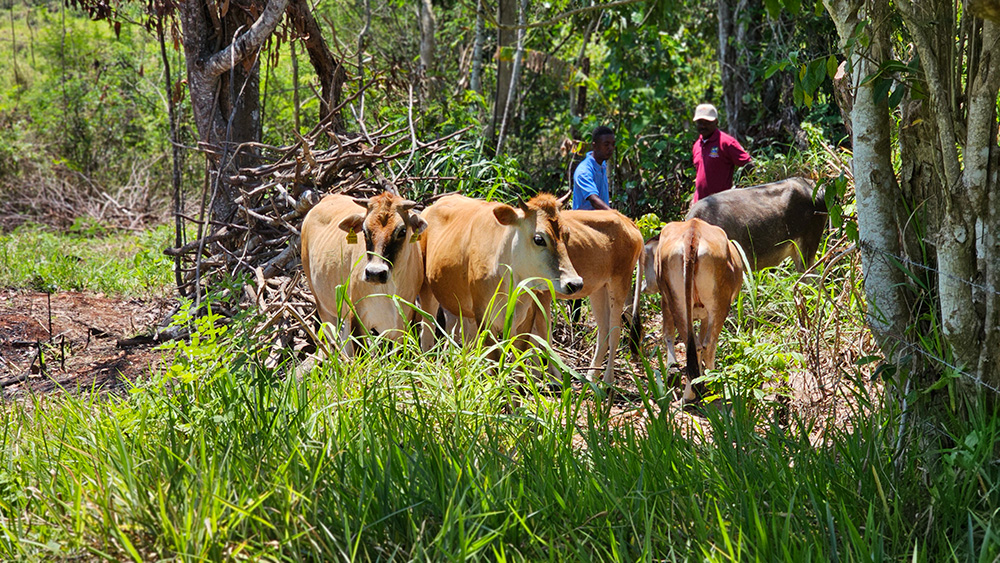𝘚𝘦𝘢𝘵𝘦𝘥 𝘢𝘵 𝘵𝘩𝘦 𝘴𝘪𝘨𝘯𝘪𝘯𝘨 𝘵𝘢𝘣𝘭𝘦 𝘢𝘳𝘦 𝘔𝘳 𝘋𝘦𝘷𝘰𝘯 𝘚𝘢𝘺𝘦𝘳 𝘰𝘧 𝘵𝘩𝘦 𝘑𝘢𝘮𝘢𝘪𝘤𝘢 𝘋𝘢𝘪𝘳𝘺 𝘋𝘦𝘷𝘦𝘭𝘰𝘱𝘮𝘦𝘯𝘵 𝘉𝘰𝘢𝘳𝘥 (𝘧𝘢𝘳 𝘭𝘦𝘧𝘵) 𝘢𝘯𝘥 𝘗𝘳𝘰𝘧𝘦𝘴𝘴𝘰𝘳 𝘓𝘪𝘯𝘤𝘰𝘭𝘯 𝘌𝘥𝘸𝘢𝘳𝘥𝘴 𝘰𝘧 𝘕𝘰𝘳𝘵𝘩𝘦𝘳𝘯 𝘊𝘢𝘳𝘪𝘣𝘣𝘦𝘢𝘯 𝘜𝘯𝘪𝘷𝘦𝘳𝘴𝘪𝘵𝘺 (𝘳𝘪𝘨𝘩𝘵). 𝘞𝘪𝘵𝘯𝘦𝘴𝘴𝘪𝘯𝘨 𝘵𝘩𝘦 𝘦𝘷𝘦𝘯𝘵 𝘸𝘦𝘳𝘦 (𝘧𝘳𝘰𝘮 𝘵𝘰𝘱 𝘳𝘰𝘸, 𝘭𝘦𝘧𝘵): 𝘋𝘳 𝘋𝘦𝘳𝘳𝘪𝘤𝘬 𝘋𝘦𝘴𝘭𝘢𝘯𝘥𝘦𝘴 𝘰𝘧 𝘊𝘈𝘚𝘌, 𝘵𝘩𝘦 𝘏𝘰𝘯. 𝘍𝘳𝘢𝘯𝘬𝘭𝘪𝘯 𝘞𝘩𝘪𝘵𝘵𝘦𝘳 𝘰𝘧 𝘵𝘩𝘦 𝘢𝘨𝘳𝘪𝘤𝘶𝘭𝘵𝘶𝘳𝘢𝘭 𝘮𝘪𝘯𝘪𝘴𝘵𝘳𝘺, 𝘵𝘩𝘦 𝘏𝘰𝘯. 𝘍𝘭𝘰𝘺𝘥 𝘎𝘳𝘦𝘦𝘯 – 𝘵𝘩𝘦 𝘈𝘨𝘳𝘪𝘤𝘶𝘭𝘵𝘶𝘳𝘢𝘭 𝘮𝘪𝘯𝘪𝘴𝘵𝘦𝘳, 𝘢𝘯𝘥 𝘶𝘯𝘪𝘷𝘦𝘳𝘴𝘪𝘵𝘺 𝘢𝘥𝘮𝘪𝘯𝘪𝘴𝘵𝘳𝘢𝘵𝘰𝘳𝘴 𝘔𝘳𝘴 𝘎𝘭𝘰𝘳𝘪𝘢 𝘎𝘳𝘦𝘨𝘰𝘳𝘺 𝘢𝘯𝘥 𝘔𝘴 𝘕𝘢𝘥𝘦𝘦𝘯 𝘊𝘢𝘮𝘱𝘣𝘦𝘭𝘭
Minister of Agriculture, Mining and Fisheries Floyd Green has tasked Northern Caribbean University (NCU) to conduct genetic engineering and climate-resilient research into better dairy cows, better tropics-suited dairy fodder, and higher milk yield per cow. He was delivering the keynote address at the launch of NCU’s Dairy Revitalisation Project in collaboration with the Jamaica Dairy Development Board in Mandeville March 28, 2024.
“NCU has to develop the next generation of T.P. Lecky’s, and that is your task!” Minister Green said, referencing the Jamaican scientist who created several breeds of indigenous cattle. Research by Thomas Phillip Lecky resulted firstly in the Jamaican Hope in 1951. Further research resulted in the Jamaican Red, Jamaican Brahman, and Jamaican Black cattle breeds.
During the launch ceremony, the JDDB and NCU signed a memorandum of understanding to formalise the partnership between the two entities. As part of the agreement, the JDDB officially handed over six Jamaican Hope dairy cows to the university. In addition, the Government will provide NCU with 40 acres of fodder, free of cost, as well as construct a new milking parlour for the institution.

Four out of six Jamaica Hope cows stayed long enough for cameras to come close.
The agriculture minister indicated that the Government wants to improve the performance of the Jamaica Hope cow by increasing the number of litres of milk each cow can produce. “We are pushing our research agenda and ensuring that we partner with institutions that have shown great capacity in research and in training. And NCU stands front and centre in that regard.”
Pointing to NCU’s commitment to applied research, Minister Green said he was impressed that the leader of the team from the university which won the 2018 International Business Model Competition had come to his office asking for farmers to participate in the testing of their research for the competition. The winning project was a technology-driven solution that combated the beet army worm that was affecting scallion (or “escallion”) and onion crops in central Jamaica.
Noting that the dairy sector in the 1990s suffered from reduced local production and more imports of milk; the agriculture minister said his ministry was intent on reversing the situation through the national dairy revitalisation programme.
In his remarks, Mr Devon Sayers, Chief Executive Officer of the JDDB, said that the partnership with NCU was part of a bigger project, called the Agricultural Educational Institutions (AEI) programme, which seeks to revitalise or create cow and goat dairy programmes, with established milking parlours, within various institutions. The project with NCU was in the making since 2019 but was temporarily on hold due to the COVID-19 pandemic.
Like Minister Green, he expected the next future agriculturalists to come from NCU. Additionally, he expressed his expectation that with the NCU dairy project, each Jamaica Hope cow will produce 25 litres of milk in the future. Sayers disclosed that the AEI programme was into genetic engineering and was willing to provide NCU with embryos and semen to participate in such research, which could also lead to beef farming.
NCU President, Professor Lincoln Edwards, in his remarks, gave an overview of the university’s history as an institution that first started out as a vocational-agricultural school in the 1800s. He said that the partnership with the JDDB was taking the university “back to its roots.” Professor Edwards also affirmed the intention of the university to meet the expectations of the government as it seeks to resurrect its own dairy farming business and further develop its agricultural degree programme.
“Our aim is to transform our existing Dairy Operations within the Dairy Unit, into an all-inclusive vertically integrated activity to include animal care, reproduction, feeding management, milking and value-added processing that provides tutorial interface and commercial output,” the NCU President said.
“We envision our dairy operation including, but not limited to, pasture management for animal feed security, dairy cattle breeding programmes, enhanced dairy technology, research and genetic improvement and community outreach aimed at building production capacity,” he added.
Jones Oliphant, president of the Manchester chapter of the Jamaica Agriculture Association, and Councillor for the Manchester Division, stated in his remarks on behalf of the Mayor of Mandeville, Donovan Mitchell, that in the past NCU produced and distributed dairy milk throughout the community, and was also big on citrus production. He lamented that much of what was NCU’s farming lands is now in housing for nearby communities. Oliphant is both a past student and worker of NCU.
On hand to witness the MOU signing were Hon Franklin Whitter, Minister of State for Agriculture, Fisheries and Mining, along with representatives of the Knockalva Polytechnic College, the Sydney Pagon STEM Academy, the College of Agriculture and Science Education (CASE), the Aluminium Company of Canada (ALCAN) – now part of the Rio Tinto Group, the Jamaica Agricultural Association and the Jamaica Union Conference of Seventh-day Adventists.


No responses yet